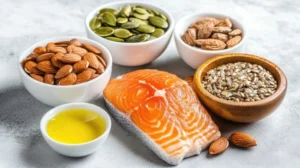Poor Egg Quality: Symptoms, Causes, and How to Boost Egg Quality Naturally
Egg quality plays a significant role in a woman’s fertility journey, impacting everything from conception to IVF success rates. Understanding the signs of poor egg quality and knowing how to improve egg quality naturally can make a huge difference when it comes to increasing the chances of a healthy pregnancy. Whether you're preparing for IVF or trying to conceive naturally, this guide will help you learn more about poor egg quality, how to improve it, and what steps you can take for a successful fertility journey.
Poor egg quality refers to eggs that are less likely to fertilize, develop properly, or result in a successful pregnancy. The quality of a woman’s eggs declines with age, especially after the age of 35, which can impact fertility. However, other factors—such as lifestyle choices, hormone imbalances, and exposure to environmental toxins—can also contribute to poor egg quality.
How to Know if You Have Poor Egg Quality
 Recognizing poor egg quality symptoms can be challenging, as many women may not have visible signs until they struggle to conceive. However, some indicators could include:
Recognizing poor egg quality symptoms can be challenging, as many women may not have visible signs until they struggle to conceive. However, some indicators could include:
- Difficulty conceiving despite trying for an extended period
- Multiple failed IVF cycles due to poor embryo quality
- Irregular or late ovulation
- Low egg count or poor ovarian reserve detected in fertility tests
If you're experiencing difficulty conceiving or suspect that your eggs may not be of the highest quality, it’s essential to consult with a fertility specialist for further evaluation.
What Causes Poor Egg Quality?
 Understanding the causes of poor egg quality can help guide your treatment plan and efforts to improve fertility. Some of the most common factors that can affect egg quality include:
Understanding the causes of poor egg quality can help guide your treatment plan and efforts to improve fertility. Some of the most common factors that can affect egg quality include:
- Age: As a woman ages, the quantity and quality of her eggs naturally decline. After 35, egg quality can decrease rapidly, leading to a higher chance of chromosomal abnormalities.
- Hormonal imbalances: Conditions like polycystic ovary syndrome (PCOS), thyroid issues, and high prolactin levels can affect hormone regulation, leading to poor egg quality.
- Genetic factors: Genetic abnormalities can cause eggs to develop improperly or lead to miscarriages.
- Lifestyle factors: Smoking, excessive alcohol consumption, a poor diet, and lack of exercise can negatively impact egg health and fertility.
- Environmental toxins: Exposure to chemicals like pesticides, heavy metals, and endocrine disruptors can cause long-term damage to eggs.
How to Improve Egg Quality Naturally
 Improving egg quality may take time, but there are several lifestyle changes and natural remedies that can help you boost your chances of conceiving.
Improving egg quality may take time, but there are several lifestyle changes and natural remedies that can help you boost your chances of conceiving.
1. Eat a Fertility-Boosting Diet:
A nutritious, well-balanced diet plays a key role in improving egg quality. Specific foods to increase egg quality include:
- Leafy greens like spinach, kale, and broccoli, which are rich in folate.
- Healthy fats from sources like avocado, olive oil, and nuts, which help support hormonal balance.
- Berries and other fruits rich in antioxidants, which protect eggs from oxidative stress.
- Lean proteins such as chicken, fish, and beans, which provide essential amino acids for egg health.
2. Consider Supplements for Egg Quality
Certain supplements can improve egg quality, especially for women over 35 or those with low ovarian reserve. Commonly recommended supplements include:
- Coenzyme Q10 (CoQ10): Known to improve mitochondrial function in eggs and may help improve egg quality in women over 35.
- Vitamin D: Supports fertility by helping regulate reproductive hormones.
- Myo-Inositol: Helps with ovarian function and improves egg quality for women with PCOS.
- Folic acid: Essential for egg health and a critical nutrient for early pregnancy.
3. Reduce Exposure to Chemicals
Environmental toxins can significantly impact egg quality. Some chemicals, including endocrine-disrupting chemicals (EDCs), may interfere with hormone production and negatively affect fertility. Limit exposure by:
- Avoiding products with BPA (found in plastics) and phthalates (found in some cosmetics and cleaning products).
- Opting for organic foods to reduce exposure to pesticides.
- Choosing natural cleaning products and personal care items that are free of harmful chemicals.
4. Exercise Regularly and Maintain a Healthy Weight
Maintaining a healthy body weight and regular physical activity can help balance hormones and improve fertility. However, excessive exercise can be detrimental, so it's important to aim for moderate exercise, such as walking, swimming, or yoga.
5. Quit Smoking and Limit Alcohol Consumption
Smoking is one of the most harmful lifestyle choices for egg health. It has been linked to lower egg quality, fewer eggs, and an increased risk of miscarriage. Alcohol also negatively impacts fertility, so it's recommended to limit or avoid it while trying to conceive.
Signs of Poor Egg Quality
 Identifying the symptoms of bad eggs can be challenging since the effects may not be immediately visible. However, certain signs may indicate poor egg quality, including:
Identifying the symptoms of bad eggs can be challenging since the effects may not be immediately visible. However, certain signs may indicate poor egg quality, including:
- Irregular periods or lack of ovulation
- Multiple miscarriages or failed IVF cycles
- Reduced ovarian reserve or low egg count discovered in fertility tests
- Late ovulation or inability to predict ovulation
If you experience any of these signs, it’s important to consult a fertility specialist for further evaluation.
How to Boost Egg Quality for Pregnancy
If you're concerned about your egg quality and looking for ways to improve egg quality for pregnancy, consider the following strategies:
1. Lifestyle Modifications
As previously mentioned, lifestyle changes, including a healthy diet, regular exercise, and reducing toxins, can go a long way in improving egg quality.
2. Fertility Treatments
For women struggling with poor egg quality, fertility treatments like IVF with egg retrieval and egg donation are potential solutions. Your fertility doctor can provide personalized treatment options based on your specific situation.
3. Acupuncture and Stress Reduction
Acupuncture has been shown to improve blood flow to the ovaries, reduce stress, and balance hormones, all of which can support better egg quality. Reducing stress through relaxation techniques like meditation and yoga can also positively affect fertility.
Foods to Improve Egg Quality
 Certain foods to help egg quality include:
Certain foods to help egg quality include:
- Nuts and seeds: Rich in healthy fats and antioxidants, nuts and seeds support hormonal balance and egg health.
- Whole grains: Brown rice, quinoa, and oats help balance blood sugar levels, promoting reproductive health.
- Fish rich in omega-3 fatty acids: Salmon, sardines, and mackerel can help improve egg quality by supporting hormonal function.
Top 10 Foods to Improve Female Egg Quality:
- Avocado
- Spinach
- Berries
- Walnuts
- Salmon
- Eggs (from free-range chickens)
- Olive oil
- Sweet potatoes
- Greek yogurt
- Quinoa
By making the right dietary choices, you can improve your egg health and increase your chances of conceiving.
Conclusion
 Poor egg quality can be a major obstacle on the path to conception, but it is not the end of the road. With the right lifestyle changes, nutrition, and medical interventions, it is possible to enhance egg quality and increase your chances of pregnancy. From eating the right foods to reducing environmental toxins and considering fertility treatments, you can take steps to improve your fertility and boost egg viability.
Poor egg quality can be a major obstacle on the path to conception, but it is not the end of the road. With the right lifestyle changes, nutrition, and medical interventions, it is possible to enhance egg quality and increase your chances of pregnancy. From eating the right foods to reducing environmental toxins and considering fertility treatments, you can take steps to improve your fertility and boost egg viability.
If you're concerned about your egg quality or struggling to conceive, consider scheduling a consultation with a fertility expert at SC Fertility Center for personalized advice and treatment options.
Frequently Asked Questions (FAQs) about Poor Egg Quality and How to Improve It
1. What are the signs of poor egg quality?Poor egg quality can be difficult to identify without fertility testing, but some signs may include difficulty conceiving, multiple miscarriages, or failed IVF cycles. Women may also experience irregular or absent periods, as well as poor embryo quality during fertility treatments.
2. How can I improve my egg quality naturally?Improving egg quality naturally can be achieved by adopting a healthy lifestyle. Focus on a fertility-boosting diet rich in antioxidants, healthy fats, and lean proteins. Reducing exposure to toxins, quitting smoking, limiting alcohol, and managing stress through acupuncture or meditation can also help improve egg health.
3. What causes poor egg quality?Poor egg quality can be caused by various factors, including aging (especially after 35), hormonal imbalances, genetic abnormalities, lifestyle choices (such as smoking and excessive alcohol), and environmental toxins. Chronic health conditions and certain medications can also affect egg quality.
4. What foods help improve egg quality?Foods rich in antioxidants, healthy fats, and essential vitamins can help improve egg quality. Consider adding foods such as leafy greens (like spinach), berries, nuts (like walnuts), fatty fish (such as salmon), and whole grains (like quinoa) to your diet. These foods support hormonal balance and reduce oxidative stress.
5. Can acupuncture improve egg quality?Yes, acupuncture can help improve egg quality by promoting blood circulation to the ovaries and balancing hormone levels. It has been shown to support overall fertility by reducing stress and improving ovarian function. Many women incorporate acupuncture alongside other fertility treatments to enhance their chances of conception.
6. Is it possible to get pregnant with poor egg quality?While poor egg quality can make conception more difficult, it is still possible to get pregnant. For women with poor egg quality, assisted reproductive technologies like IVF (with egg retrieval) or egg donation can increase the chances of a successful pregnancy. It’s essential to consult a fertility specialist to explore the best options for your situation.
7. What supplements are helpful for improving egg quality?Supplements like Coenzyme Q10 (CoQ10), Vitamin D, Myo-Inositol, and Folic Acid are commonly recommended to improve egg quality. These supplements help enhance mitochondrial function in eggs, regulate reproductive hormones, and support overall fertility. Consult with your doctor before starting any supplementation.
8. Can late ovulation affect egg quality?Late ovulation can sometimes be associated with poor egg quality. Eggs released later in the cycle may not be as viable, and hormonal imbalances can affect ovulation timing. If you’re experiencing late ovulation or irregular cycles, it’s a good idea to consult a fertility expert for evaluation and advice on improving egg quality.

